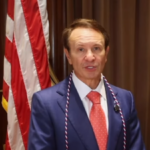President Vladimir Putin comes to Budapest. At least, that’s what the invitation says.
After a lengthy phone conversation with President Donald Trump on Thursday, the leaders of the United States and Russia tentatively agreed to meet in the capitals of the European Union and NATO in the near future to discuss a possible halt to a full-scale invasion of Ukraine.
Or not head and head Although it is not yet clear what will happen, the news itself sent shockwaves across the capital, as the visit would be Putin’s first incursion into European Union territory since early 2020 and could further undermine Western efforts to isolate him.
But beyond the geopolitics driving this initiative and the complexities involved in establishing a summit of this scale and consequence, one fundamental question emerges. The question is, can President Putin actually join the EU?
At least two different aspects need to be considered.
EU sanctions
Immediately after Russian troops breached Ukraine’s border and marched into Kiev, the EU rushed to apply a range of sanctions to weaken the Kremlin’s war machine.
In a number of decisions, member states sanctioned hundreds of Russian officials responsible for planning and overseeing the invasion. The blacklist included a ban on travel within the region and a freeze on personal assets.
President Putin and Foreign Minister Sergei Lavrov were also targeted, but there were caveats. Only their assets were frozen. This was a symbolic move given the opacity surrounding Putin’s wealth. travel ban not introduced To maintain a minimum level of diplomatic contact.
Putin became the third world leader to be personally sanctioned by the bloc, following Belarusian President Alexander Lukashenko and then-Syrian President Bashar al-Assad, according to then-High Representative Josep Borrell.
This means that President Putin will be allowed to land in Hungary in that respect.
But there are further obstacles. The EU has effectively closed its airspace to Russian aircraft as part of a broader sanctions regime.
According to the European Union Aviation Safety Agency (EASA): No flight allowed It applies to aircraft operated by Russian airlines, registered in Russia, owned or chartered by Russian individuals or entities, and to “non-scheduled” flights capable of transporting Russian nationals to business meetings or holiday destinations within the EU.
There are some exceptions to this rule, such as emergency landings and humanitarian purposes. Additionally, Member States may grant exemptions on a case-by-case basis.
Last year, Sergey Lavrov traveled I went to Malta for a meeting of the Organization for Security and Co-operation in Europe (OSCE), which was very controversial. the minister was forced to do something 7 hour detour They were allowed to land on diplomatic grounds to avoid European airspace until they reached the island.
In contrast, his spokeswoman Maria Zakharova, who is facing a travel ban and asset freeze, said: rejected The exemption was decided after several capitals objected.
President Putin may have two options. Either embark on the long detour of entering Hungary via the Western Balkans’ EU candidates, or take the shorter route and secure exclusion from the EU. Poland is likely to be difficult, Slovakia is likely to be easy.
Another option could include a flight through the Black Sea and Kiev’s staunch ally Romania, which is sending a multinational NATO contingent.
The European Commission, which oversees the implementation of sanctions, has welcomed “any measures that lead to a just and lasting peace in Ukraine” but has declined to commit to facilitating future summits.
It remains to be seen what steps President Trump will use to ensure the talks proceed, and whether this point was already resolved when the Budapest option was discussed between the U.S. and Russian presidents.
Putin’s return to European soil would in itself be a victory for the Russian leader after years of isolation, and a difficult moment for the EU as leaders consistently watch Russian and American presidents meet in EU member states. derail collective support for Ukraine.
But there is a risk that denying Putin a visit to Budapest could be used by the Kremlin to underline its argument that it is the EU itself that seeks conflict with Russia rather than peace. Kiev’s position at the summit could influence the resolution of this dispute.
ICC arrest warrant
In addition to directly enforceable EU sanctions, Putin has an arrest warrant issued by the Hague-based International Criminal Court (ICC).
President Putin and Children’s Rights Commissioner Maria Alekseevna Lvova-Belova are accused of expelling and transferring tens of thousands of Ukrainian children from occupied territories to Russia, a war crime.
Neither Russia nor the United States are parties to the ICC and therefore do not recognize its jurisdiction. (The Kremlin issued a warrant to the prosecutor general of the court.)
Meanwhile, all EU countries have signed the Rome Statute and are expected to support the global fight against impunity by default.
Earlier this year, Hungary became the bloc’s first member state. announce Hungary, like the United States, has said it will withdraw from court in response to an arrest warrant issued for Israeli Prime Minister Benjamin Netanyahu.
The decision was made public shortly after Hungarian Prime Minister Viktor Orbán welcomed Netanyahu in Budapest and openly flouted his binding obligations.
However, Hungary’s withdrawal will not take effect until June 2026, one year after it was notified. During the interim period, the country remains bound to the courts.
An ICC spokesperson told Euronews: “The withdrawal does not affect ongoing legal proceedings or matters that were already being considered by the court before the date on which the withdrawal takes effect.”
“If states have concerns about cooperating with the court, they can consult the court in a timely and efficient manner. However, states cannot unilaterally determine the soundness of the court’s legal decisions.”
Importantly, the ICC I don’t have the means Execution of warrants relies solely on the goodwill of governments. Last year, Mongolia, a party to the ICC, faced criticism from Europe They accepted President Putin’s state visit, but there were no consequences.
A similar scenario unfolded during the Orban administration. welcomed Prime Minister Netanyahu in April.
“If President Putin lands (in Budapest), his arrest will be a natural consequence,” said a senior EU diplomat, speaking on condition of anonymity.
“No one will be surprised if the Hungarians don’t arrest Putin. This is not the first time Hungary has violated its (ICC) obligations. So there is certainly a problem.”
The ICC often encounters the obstacle of diplomatic immunity.
However, Article 27 of the Rome Statute states that the rule applies to all persons “without distinction on the basis of their official capacity”, including heads of state and government. Article 98, on the other hand, provides that states “may not proceed” with issuing warrants if they violate the obligation to respect the immunity of non-state parties.
Mahmoud Abuwasel, deputy director of the Hague Institute for International Justice, told Euronews in April: “If national law says that a head of state cannot be arrested, that he has immunity, then that is probably the case.”
“But that particular state cannot make that decision on its own. The state would have to consult with the ICC, (and) the ICC may decide for some reason that immunity does not apply.”
While defending the court, France said Israel cannot arrest Netanyahu because it has not signed the Rome Statute. Hungary may also bring forward a similar argument. In fact, the country has already promised Putin safe travel.








